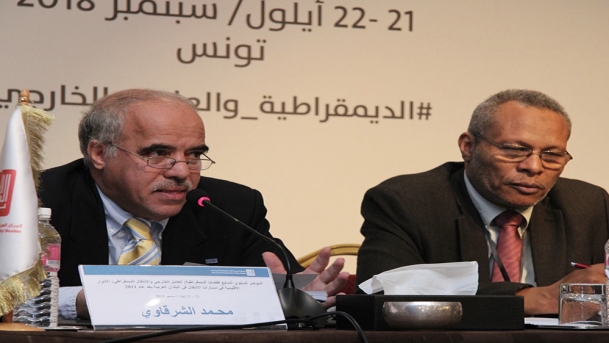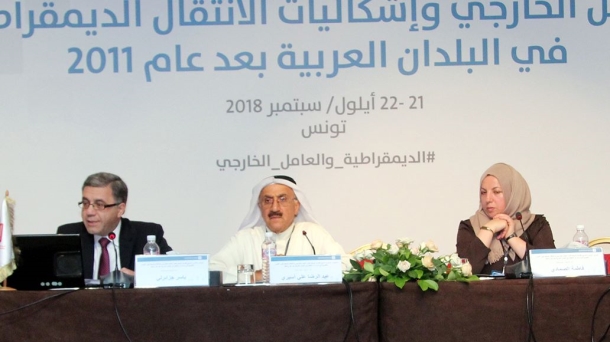
The Arab Center for Research and Policy Studies concluded its seventh Annual Conference on Democratic Transition in Hammamet, Tunisia September 22, after hosting seven panels on the modalities and impact of foreign actors under the title “External Factors and the Post-2011 Democratic Transition in the Arab Region.” Dr. Mohammed Cherkaoui was among the 21 panelists to focus on the theme “The Arab Uprisings and America’s Position: Ethical Politics or Interest-driven Strategies?” He initiated his presentation with an overview on how most of the 2011 uprisings activists were disappointed with the position of Western countries, especially the United States, whose foreign policy had been saturated, for decades, with the rhetoric of spreading freedom and supporting democratic transitions in the world.
Early in the new millennium, the Bush Jr. administration sought to support the Arab civil society institutions and promote the role of women in public life. The Neo-conservatives then adopted the theory of gradual reform and the concept of ‘creative chaos’ advocated by then- Secretary of State Condoleezza Rice in 2006. They counted on moderate voices and reformist parties without openly pushing for regime change in these countries, in light of the chaotic situation in Iraq after the invasion. However, the popular grievances in Tunisia in late 2010 and the subsequent pro-change movement had a domino effect in other Arab capitals. This shift took the Obama administration by surprise. Washington had different positions on the Libyan, Syrian, Yemeni crises in comparison with the other uprisings. Under the presidency of Donald Trump, the American foreign policy has entered a political eclipse due to the predominance of Americanism on Globalism.
Dr. Cherkaoui focused on the context and trajectory of the US positions toward the Arab Uprisings by examining the Middle East policies of three presidents: George W. Bush, Barack Obama, and Donald Trump. Washington has had a swing analysis of priorities between supporting existing totalitarian regimes and monitoring the emerging social movements and other non-state actors and the mobility of the grass-roots groups from Morocco to Iraq. He adopted two hypotheses: a) the American position on Arab volatility is a practical test of the democracy assistance and globalization of democracy theories as the basis of the gradual reform within the strategy of the American foreign policy. b) The study of the American position on Arab uprisings requires probing into the impact of the external factor, not from a normative outside-in approach, or what the Arab masses had expected as moral politics, rather from a realistic vision, or inside-out approach, according to Washington's assessments and the logic of its strategic interests in the region. Washington sometimes contradicts its own ideals, values, and foreign policy literature on freedom and democratic reforms, as in the Trump era.
In a different panel, Dr. Fatima Smadi focused on the theme “From Tunisia to Syria: How Iran dealt with the Arab Revolutions”, and how the Iranians sought the opportunity to strengthen their influence and preach by disseminating a political model called "religious democracy". She argued that the Iranian position has derived from the imperatives of Iran’s national security and the pragmatism of its strategic interests despite the attempt to highlight the ideological and rhetorical dimension. She probed into how the Iranians diminished their enthusiasm toward the open-ended revolutions, and focused on the positions of the Islamic Republic towards the Syrian revolution in particular. Iran has shaped its Arab foreign policy within the context of regional and international rivalries. Tehran decided to support the regime of Bashar al-Assad in Syria against a popular revolution, which Tehran sought to stigmatize as a "non-national phenomenon." Although many Iranian studies have acknowledged the influence of the internal factor as the main driver of the protests, the Iranian position has been shaped by a cautious interpretation of the impact of external factors, and what they could trigger inside Syria. Such interpretation remains concerned with the ramifications of those external factors on the emerging strategic Iran-Syria-Hezbollah triangle, which could have some negative affect on Tehran’s regional influence. This shift was a turning point in Iran’s strategy toward the other Arab revolutions in Tunisia and Egypt. Iran’s spiritual leader Ayatollah Khamenei conceived those revolutions as a "divine civilities."
The Arab Center for Research and Policy Studies plans to publish the papers presented at the conference in an edited book in the near future.
 |
| [Al Jazeera] |